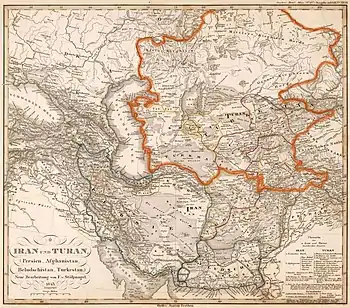طوران
طوران (بالأفستية: Tūiriiānəm، بالفارسية: توران) (بلاد الطور) مصطلح إيراني الأصل يشير إلى المنطقة التاريخية في آسيا الوسطى [1] وقد يشير إلى مستوطنة بشرية في عصر ما قبل التاريخ أو منطقة جغرافية تاريخية أو ثقافة. كان الطورانيون الأصليون قبيلة إيرانية من عصر أفستان.[2][3][4]

"خريطة ألمانية لإيران وتوران" مؤرخة عام 1850 (خلال عهد أسرة قاجار) ، يشار إلى إقليم توران بخط برتقالي . يظهر اسم «توران» شرق بحر آرال.
وفقًا للأسطورة (أسفل يمين الخريطة) ، تشمل توران مناطق أوزبكستان اليوم وكازاخستان والأجزاء الشمالية من أفغانستان وباكستان. تتوافق هذه المنطقة تقريبًا مع ما يسمى اليوم بآسيا الوسطى.
قائمة المناطق المذكورة في الخريطة كجزء من توران هي ما يلي: 1. خوارزم 2. بخارى وبلخ 3. شهرسبز (بالقرب من بخارى) 4. حيصور 5. قوقند 6. دورواز 7. كاراتيجين 8. قندوز 9. كافريستان 10. شيترال 11 غلغت 12. سكردو 13.14. السهوب الشمالية (كازاخستان).
طالع أيضا
مراجع
- Emeri "van" Donzel, Islamic Reference Desk, Brill Academic Publishers, 1994. pg 461. Actual Quote: Iranian term applied to region lying to the northeast of Iran and ultimately indicating very vaguely the country of the Turkic peoples.
- Allworth، Edward A. (1994). Central Asia: A Historical Overview. Duke University Press. ص. 86. ISBN:978-0-8223-1521-6.
- Diakonoff، I. M. (1999). The Paths of History. Cambridge University Press. ص. 100. ISBN:978-0-521-64348-1.
Turan was one of the nomadic Iranian tribes mentioned in the Avesta. However, in أبو قاسم الفردوسي's poem, and in the later Iranian tradition generally, the term Turan is perceived as denoting 'lands inhabited by Turkic speaking tribes.'
- Gnoli، Gherardo (1980). Zoroaster's Time and Homeland. Naples: Instituto Univ. Orientale. OCLC:07307436.
Iranian tribes that also keep on recurring in the Yasht, Airyas, Tuiryas, Sairimas, Sainus and Dahis
- بوابة آسيا
- بوابة إيران
- بوابة الشرق الأوسط
- بوابة تركيا
This article is issued from Wikipedia. The text is licensed under Creative Commons - Attribution - Sharealike. Additional terms may apply for the media files.